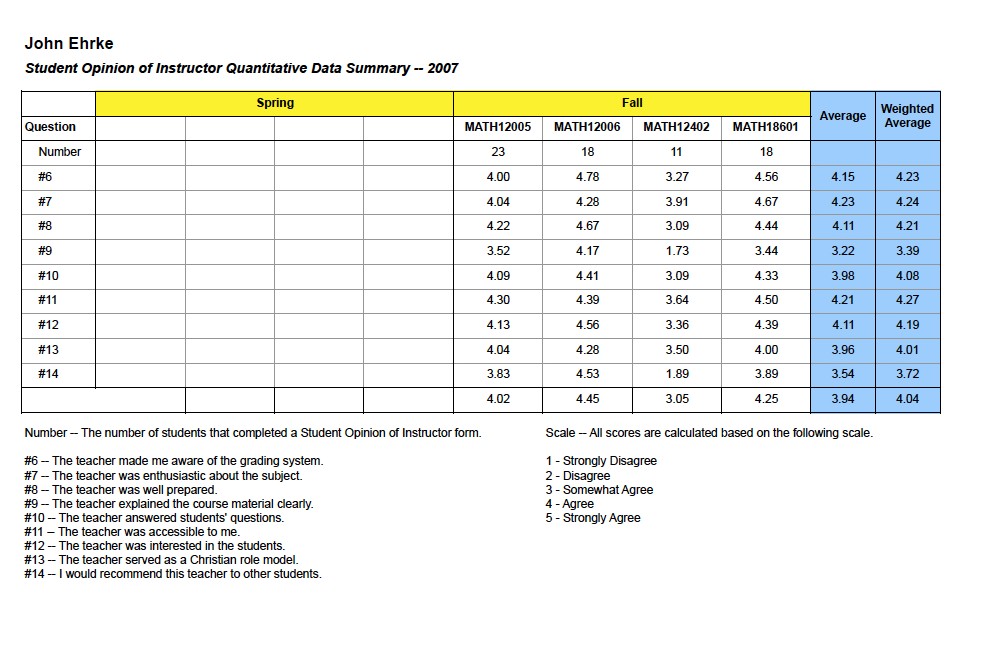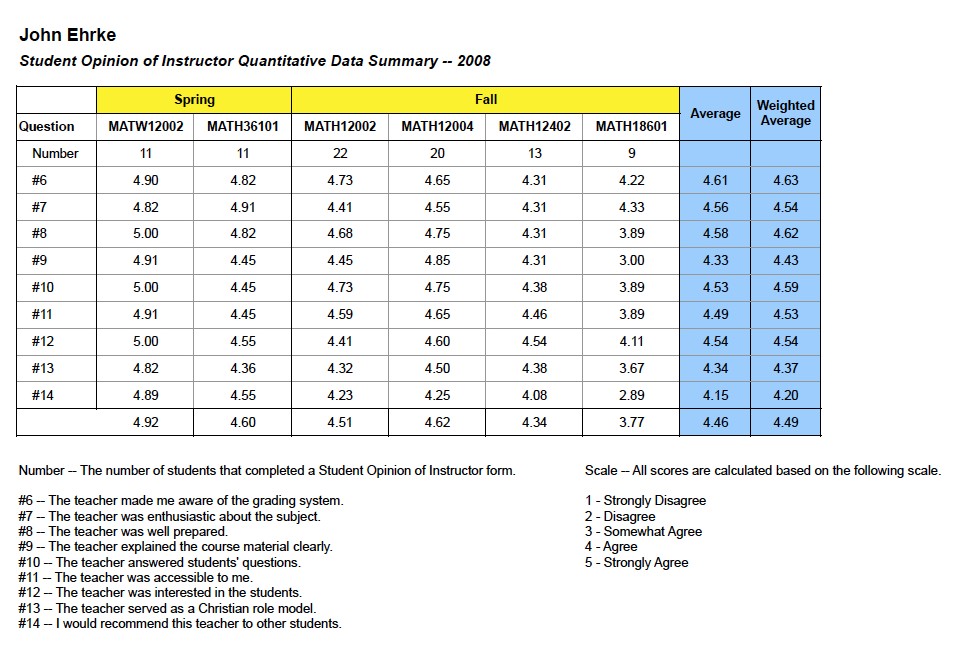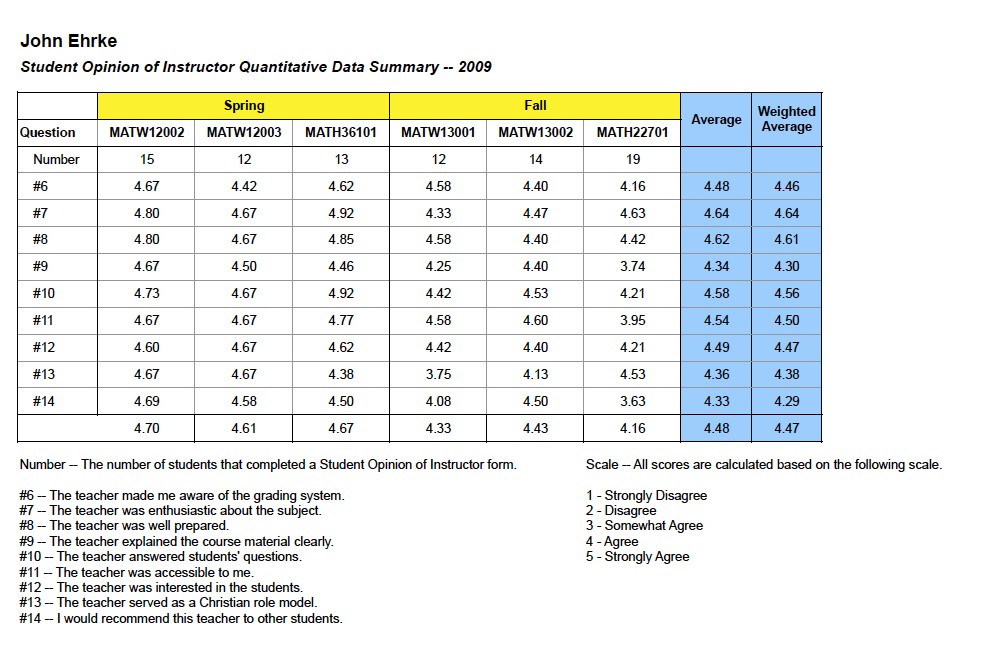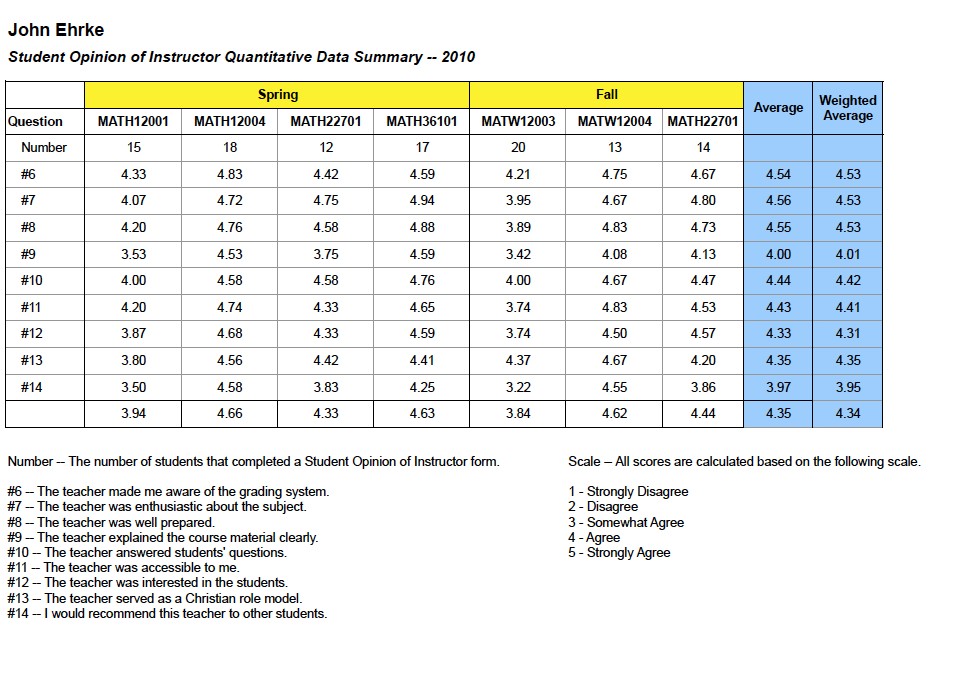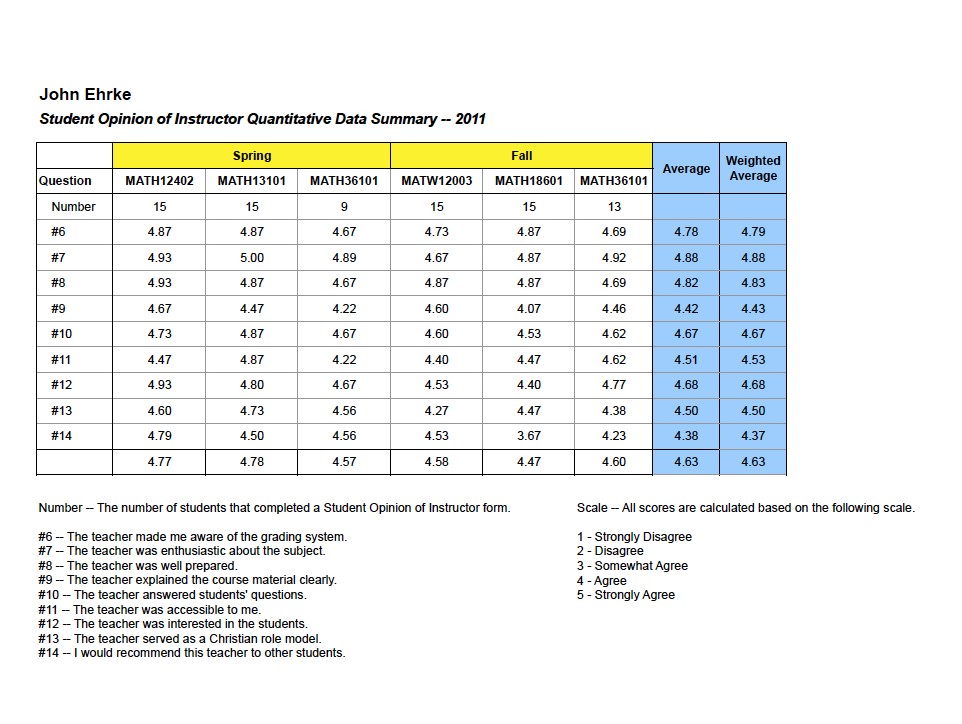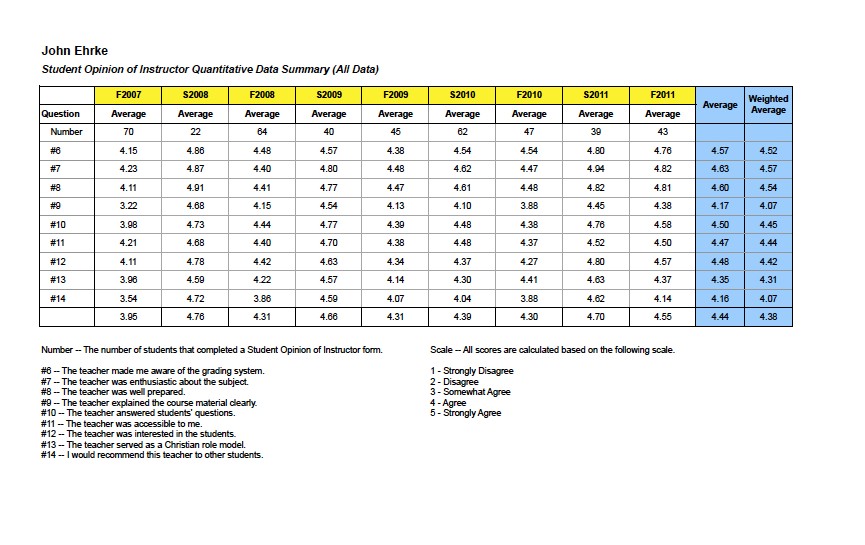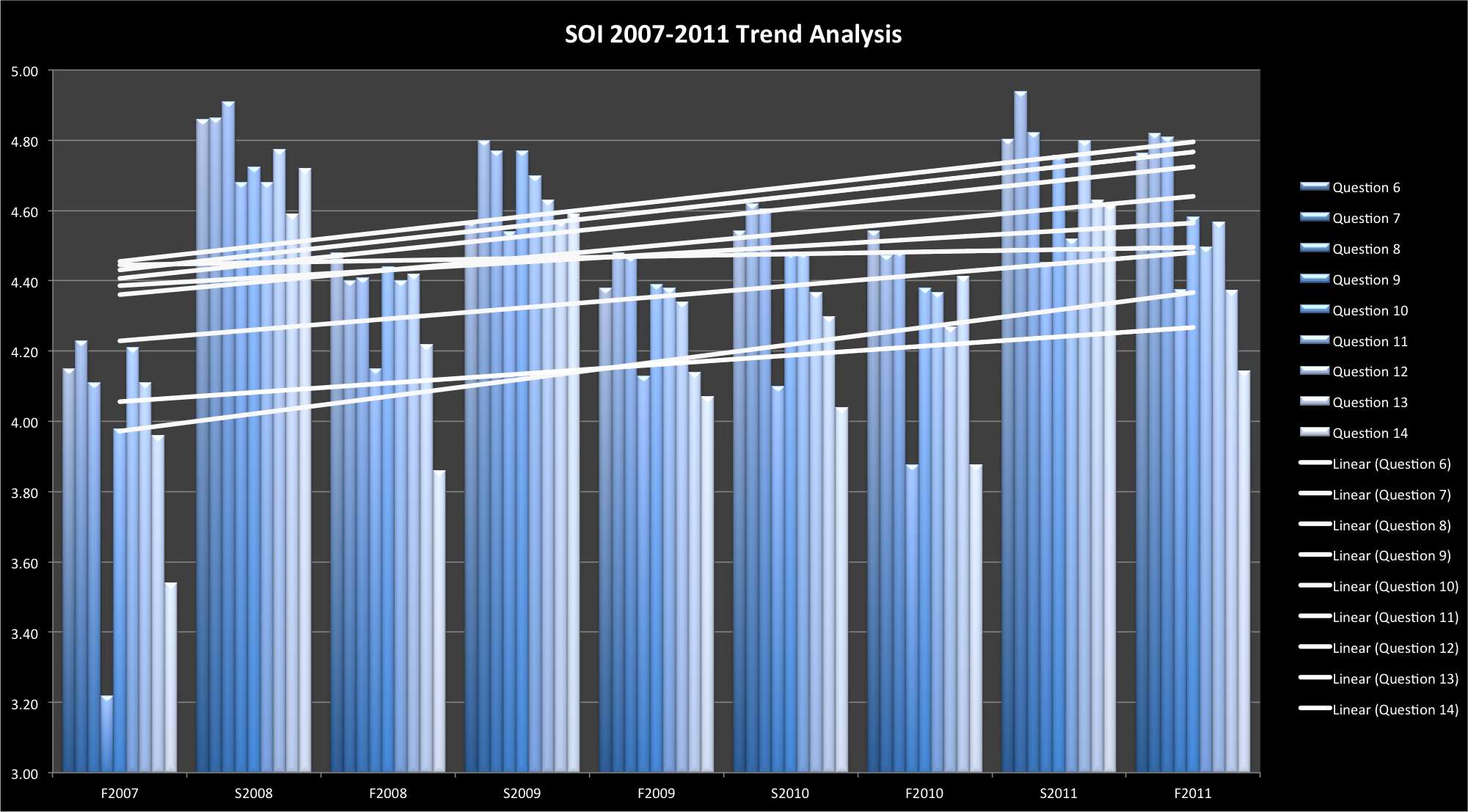In this section, we will examine the student opinion of instructor results, henceforth referred to as SOI, from each semester organized into tabular data. Student comments and reflection on the results are provided at the end of the section.
Student Opinion of Instructor Data – Fall 2007
_______________________________________________________________________
Student Opinion of Instructor Data – Fall and Spring 2008
_______________________________________________________________________
Student Opinion of Instructor Data – Fall and Spring 2009
_______________________________________________________________________
Student Opinion of Instructor Data – Fall and Spring 2010
_______________________________________________________________________
Student Opinion of Instructor Data – Fall and Spring 2011
_______________________________________________________________________
Student Opinion of Instructor Data – Combined
Remarks
By far, the class in which I received the lowest marks is the Fall 2007 (my first semester at ACU) MATH 124, PreCalculus II course. I recall struggling with managing that course in particular because of a wide array of student skill levels and previous knowledge. Some of the student comments from the course:
Not assume that people just know things…”you will remember from Precal one.” Most people just got confused
His teaching was too complicated at times because he explained things we didn’t need to know and his teaching at times was too easy for what showed up on quizzes and tests.
There were also several comments along the lines of making the material clearer, or explaining things better. In response to these comments, when I taught the course the following Fall, I provided a comprehensive set of lecture notes, streamlined the course taking out a few topics that were superfluous and reviewed material from PreCalculus I where appropriate. As a result the numbers for the Fall 2008 and Spring 2011 semesters showed marked improvements. Some student comments from these semesters:
He was very interesting. He came to the problem thinking the way a student might think and made little refreshers to remind us of past knowledge instead of just expecting us to know things.
He had us teach him how to do the problems. Even if we knew it wouldn’t work he would show us why it wouldn’t work and how to do it the correct/easier way.
The only course where my numbers showed regression the second time teaching a course was in MATH 186, Calculus II between the Fall 2007 and Fall 2008 semesters. I have some theories as to why this was the case: (1) Beginning in the Fall 2008 I placed a higher emphasis on investigating content in Maple that some student were not prepared for. (2) I raised the level of the course from its initial level. Some of the student responses speak directly to this.
He could work a wider expanse of problems. Problems tended to be examples of easy problems, it would have helped to work harder examples.
Maybe calm down a little bit on tests and homework.
I think what the general student response is in this regard is that my assessment for the course should more accurately reflect the material discussed in class and worked on the homework. I agreed. I made an honest effort to align exam type assessments more closely with the course material while also simultaneously increasing rigor in homework. I have also overhauled the lecture slides available to the class and implemented screencasting resources for students struggling with Maple and other more difficult topics. As a result my numbers in Fall 2011 showed a considerable jump from their 2008 levels and even surpassed the 2007 levels. I anticipate the Spring 2012 numbers to be even better despite a more rigorous course experience.
In the most recent iteration of the course some of the student comments reflected positively on these changes.
He made lectures very interesting and insightful, and he was willing to help us out if we did poorly on a test.
I appreciated that the instructor created notes to go with the lecture and then made these notes accessible to students.
As a general overview, I have included a chart mapping all my average scores per question, for each semester. The chart includes a set of trend lines for each question asked of students on the SOI form. All of the lines highlight positive trends and indicated growth as whole over my five years of teaching. (Please note the vertical axis of the chart begins at a 3.0 since no scores were recorded below this value. This helps make changes in the chart and associated trends more readable.)
In addition to the specifically highlighted cases above, I include the following student comments which speak to specific aspects of what makes my teaching effective.
- Engaging Content He made use of interactive explanations whenever possible, especially visual ones… He provided a lot of material for students to review outside of class: videos, website, power points, homework.
- Knowledge of Subject Matter, Enthusiasm He was confident in what he was instructing the class about and was enthusiastic during class. This made it a fun class and a great learning environment…Dr. Ehrke was very enthusiastic abou the subject and he tried to apply the course to real life where he could. He challenged us on a daily basis…We could tell he loves this stuff…I think the instructor knows his material through and through, so that helps…His passion is a trait that I have missed in a good portion of my professors so far in college. It makes the class much more enjoyable and easier to learn…Actual interest in the subject. So often I hear of computer science or even philosophy teachers teaching math and I wonder how that works. Thank you for giving me an actual math professor.
- Accessibility to Students, Mentoring Very accessible to student to answer individual questions. He understands the subject thoroughly and is willing to help others understand…In my 18 years of schooling I have never been able to grasp on to math until now…Best teacher I’ve had. Made sure students understood the material. Held tutoring sessions and was available all the time to make sure students learned the material. Never seen a teacher be as helpful…He gave us the option of having mentoring meetings for extra credit. That was lovely because we get tips on how to improve our thought processes and get extra points on homework.
- Ability to Communicate It’s the case that he’s a very good speaker and was well prepared…He was very engaging and made the material (which I generally find boring) interesting. I enjoyed coming to class.
- Integration of Faith and Learning He was a great teacher! I’m really bad at math but I feel smarter now than I did entering the class. And now I know how to apply logic to my Faith and everyday life…He’s the only teacher I know that could link math and scripture. Very cool. Really enjoyed it.
Whether it be the use of podcasts to enhance student learning or engaging in-class visualization of complicated mathematical objects, I have embraced the use of technology as a teaching tool in every course I have taught while at ACU. I continue to iterate, retool, and reform old lecture content to be more engaging, more up to date, and more accessible to students.
I have a long history of public speaking success dating back to state-wide recognition as a debater in high-school. I use these God-given talents to effectively communicate with my students and draw them into the material. I am able to take a subject which many students have negative pre-conceptions about and turn them completely around to appreciate mathematics as I do. I’ll leave with you with a few of my favorite student comments from the past five years.
I really enjoyed this class, I feel like I learned a lot. It made me remember just how much I love math, and realize that I’d rather do math the rest of my life than what I had been majoring in, so I changed, thus making this class not count for my degree, but I still enjoyed it.
Thanks for teaching this course. It’s been my favorite at ACU so far. Now I want to be an engineer. You made me enjoy math again and gave me the confidence to pursue higher objectives.
To me there is no greater complement I can receive as a mathematics teacher than these. As you form an opinion of the effectiveness of my teaching I ask you to consider the level and quality of the content I’ve produced, the impact I’ve had on my students’ attitudes toward math and learning, my enthusiasm for and knowledge of the subject, and my willingness to reflect upon and adapt my own teaching practices to better meet the needs of my students while maintaining a high level of academic rigor.
<<< Annual Reflections Engaging Content >>>

